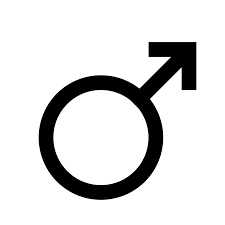male
英 [meɪl]
美 [meɪl]
- adj. 男性的;雄性的;有力的
- n. 男人;雄性动物
- n. (Male)人名;(柬)马尔;(意、西、塞)马莱;(英)梅尔
使用频率:

记忆方法
将“male”分解为“mal”和“e”,可以将其想象为“male”性别的“英雄”(hero),因为“hero”和“male”都含有“hero”的“hero”部分,这样有助于记忆单词的含义。
以上内容由AI生成, 仅供参考和借鉴
中文词源
male 恶劣的,可怜的,不幸地,过分地
来自拉丁语malus,坏的,邪恶的,罪恶的,前缀mal-的原型。
male 男的,雄性的缩写自拉丁语masculus,男的,雄性的,来自mas,男人,雄性动物,词源同marry.
英语词源
- male
-
male: [14] The Latin word for ‘male’ was masculus (from which of course English gets masculine [14]). It passed into Old French as masle, which later became male – hence English male. The Spanish descendant of masculus is macho, which means ‘virile’ as well as simply ‘male’, and has given English macho [20] and the derivative machismo [20]. Another close relative is probably mallard, which seems to mean etymologically ‘male bird’. Female, incidentally, despite its similarity, is not etymologically related to male, although the two have converged formally owing to their semantic closeness.
=> macho, mallard, masculine - male (n.)
- late 14c., "male human being; male fish or land animal," from Old French masle (adj.) "masculine, male, adult," also used as a noun (12c., Modern French mâle), from Latin masculus "masculine, male, worthy of a man" (source also of Provençal mascle, Spanish macho, Italian maschio), diminutive of mas (genitive maris) "male person or animal, male."
- male (adj.)
- late 14c., from Old French male, masle "male, masculine; a male" (see male (n.)). Mechanical sense of "part of an instrument that penetrates another part" is from 1660s.
权威例句
- 1. The army is still one of the last male bastions.
- 军队仍然是男人占据的最后堡垒之一。
- 2. We were in the same college, which was male-only at that time.
- 我们那时在同一所学院,当时只招男生。
- 3. The London City Ballet has engaged two male dancers from the Bolshoi.
- 伦敦市芭蕾舞团从波修瓦芭蕾舞团聘来了两名男舞蹈演员。
- 4. In male company, perhaps he did overstep the bounds of propriety.
- 在清一色男性的公司里,可能他的举止确实有失得体。
- 5. I realize there's no consensus on what are male or female values.
- 我意识到人们对什么是男性价值观和什么是女性价值观并无共识。
